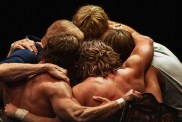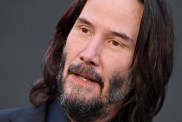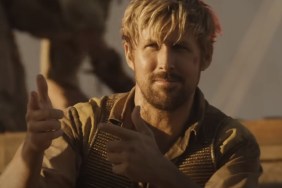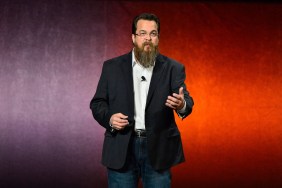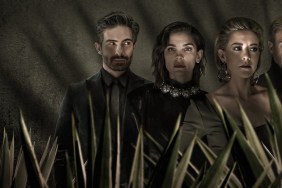Back in the ’90s, author Tom Clancy was one of the top bestselling authors with his political thrillers starring Jack Ryan, a former Marine-turned-CIA analyst whose savvy with all things espionage turns him into one of the agency’s top men during the Cold War against the USSR. In Clancy’s series of novels, he would eventually become Deputy Director of Central Intelligence, gets into politics and becomes the President of the United States.
Four movies have been made featuring Clancy’s character–The Hunt for Red October starring Alec Baldwin, Clear and Present Danger and Patriot Games starring Harrison Ford, and The Sum of All Fears starring Ben Affleck. It’s been over 10 years since that last movie and every story needs to start somewhere, which may be why Paramount Pictures and original producer Mace Neufeld, who has been involved with all four previous “Jack Ryan” movies, have come up with Jack Ryan: Shadow Recruit. This one stars Chris Pine, who so successfully played the younger James Tiberius Kirk in J.J. Abrams’ two “Star Trek” movies that it seemed like kismet to give him a crack at Clancy’s character in a prequel reboot to the four previous movies.
Over a year ago, ComingSoon.net was in London where the production was rolling with director Kenneth Branagh at the helm, following the success he had with Marvel Studios’ Thor in 2011. They had been shooting weeks both at Pinewood and Leavesden Studios, but on the weekend, they were shooting on location, this weekend at Liverpool Street Station in East London’s financial district. As might be expected, the area looked a bit like an underground train station with modern buildings and artsy scaffold-like structures of metal beams, something that had been lovingly referred to as “Death Star” by some of the crew. This was representing modern Russia and the plaza felt very much like it could have been ripped straight out of Moscow, especially with a large bronze statue of a naked woman. There was also a very prominent large logo with the letter “C” on it that looked eerily like the “Enron” logo, though this was clearly there to represent the CEO of the Russian business corporation, one Viktor Cheverin.
The feeling of being in Moscow was enhanced by the extras who walked across the plaza, dressed as if it might be a cold Russian day–it was pretty nippy out actually–although this was clearly the city’s financial district so everyone was dressed fairly well. We mostly watched Pine, dressed sharply in a suit and tie with a long jacket over it, going up and down escalators and stairs, getting out of cars or going into a van, which we learned was the way for him to get away from those who are following him.
On our arrival, we were led to a quaint pub called the “The White Horse Pub” which was closed on weekends, but they had taken it over for our press visit so we’d have a quiet place to talk to the actors and the filmmakers behind this attempt to bring Clancy’s espionage hero back to the screen. Once we were settled into the pub with some sandwiches and snacks, Mace Neufeld was the first to answer the question on most on most of our minds, which was “Why bring back Tom Clancy’s CIA hero at this point in time?”
“Why not? I’ve been trying to restart it for 9 years,” the veteran producer told us. “With executive changes and having really run out of books that we could do, what triggered it was getting a green light with Kenneth. Kenneth came in, I had only talked to him years ago when I called him about directing a film, after he’d done that thriller ‘Dead Again.’ We had lunch, and he had read the script and liked it, had some suggestions, but more than that, he had gone beyond the call of duty and read every Tom Clancy book, and that’s a lot of pages. He’d seen all the movies, and was totally prepared and very enthusiastic. The idea of shooting it in London came from Kenneth and David (Barron). Because we had been planning on either Montreal or Toronto, with some plate units in New York and plate units in Moscow. And when the idea of London came up, we immediately said, “Oh my God, it’s so expensive just to take a taxi cab or even have a lunch here.” But then David and Kenneth came to Paramount, and they had done a location survey, and a beautiful screen presentation, and a book showing these wonderful Moscow locations all in London.”
Neufeld and Barron were joined in this venture by frequent Paramount production partner Lorenzo di Bonaventura, who had been developing the project and was pulling double duties in East London, overseeing Jack Ryan, while at the same time filming RED 2 with Bruce Willis not too far away. Di Bonaventura talked about the challenges of making a new Jack Ryan movie, something he had been developing for many years as a script called “Moscow.”
“I think the first challenge is that Mace put together this great series of films–their intelligence, their entertainment value–so he set a pretty high bar,” Di Bonaventura said. “That in of itself was in some ways the biggest challenge, because he didn’t really want to screw up after all those good films. I think the big break for us came when Ken came on board. It’s very interesting to watch him work because he’s such an actor’s director, but at the same time, with ‘Thor,’ he clearly had the chance to play in a bigger venue so he’s put those two things together here. This is a lot about performances, this is emotional context that’s going on between Jack and his fiancée.”
Di Bonaventura continued, talking about the general premise of the movie. “Jack as a character is going through this decision-making process–this is really the origin story–so the result of it is that you see a guy who doesn’t view the CIA with rose-colored glasses, that’s for sure, debating the merit of becoming part of a government organization of any kind. It was really important to have a director who could get that emotional context going. Jack’s also a guy, because of the line of work he’s in, he’s not told everything to his fiancée, so that’s been building in their relationship. There’s a great pressure cooker going on because what his job is because it’s hard enough having a relationship if you’re hiding partly what you’re doing.”

“I guess the script arrived and it was unputdownable and I knew the previous films, I’d read some of the books and simple as that,” described director Kenneth Branagh about his entry into the world of Tom Clancy during his relatively short session with the press. “It came out of the blue. I was going to be making another movie, it went away, and this one came to me, and I read it and responded very strongly as a kind of film I go to see. It’s the kind of film that the world of the film has the antecedent of ’70s movies, of great style that I very much admired. ‘All the President’s Men,’ ‘Parallax View’ – quite extreme espionage thrillers with slightly distorted worlds.”
“I liked Bond and I liked Bourne and I liked ‘Mission: Impossible’ and this is distinct from all those because he’s not a paid assassin,” Branagh continued. “He’s not a man coming up from program. We don’t have the flamboyance of say Bond and we don’t have the extremity of something like ‘Mission: Impossible’ as far as the technology and things that go on. In a weird way, even though Jack Ryan is the brightest and the best, he’s sort of an analyst with the great skillful, intellectual mind. He’s also in relative terms, he’s kind of an everyman. He doesn’t have the range of skills that Liam Neeson and I have–a very particular set of talents–but he’s got his brain and he’s got a desire to do something, to serve in some way and so all of that. It’s rich stuff.”
“With something like ‘Thor,’ the human dimension inside a world full of fantastical elements and many disparate elements often felt like you were making lots of different films and with this, there’s also that element which for me, if you can get it right, leads to an interesting experience for the audience. You get surprised, there’s unexpected turns, and at the center of it, in both cases and certainly here, is this human element. The script engaged me because it was a page-turner, but this big personal story that you’re invested in is at the heart of it.”
One of the highlights of our visit to the set was an absolutely amazing 36-minute interview with actor Kevin Costner, who had come to set just to talk with us. Costner takes on the role of William Harper, the CIA operative who recruits Jack Ryan. “He’s not that traditional character of mentor. He’s a guy of action, too, a field agent and a little more senior,” Di Bonaventura clarified about Costner’s character. “We’ve seen a lot of movies with the older mentor and the younger agent, and this movie doesn’t do that. He’s in the field with Jack. When things go wrong, he gets thrust into the middle. It creates a different relationship between the two men. It’s also the movie where they are meeting. It’s first movie where they get a sense that they are working together, and there’s a relationship tied to, ‘What are we going to do here?'”
William Harper never appeared in any of Clancy’s books or previous movies under that name, but there had already been talk about Costner reprising the same role for a move based on Without Remorse where he pulls a similar bit of recruiting for another Clancy CIA operative, John Kelly. (Incidentally, that 1993 Clancy novel is being adapted by Christopher McQuarrie (Jack Reacher) and Costner has been attached to star, but Mace Neufeld has nothing to do with that project and it seems to be in development completely separate from the upcoming Jack Ryan reboot.)
Besides speaking about what it’s like to work with Chris Pine and Branagh, Costner told us a few career anecdotes, including the fact he had originally been offered the role of Jack Ryan in The Hunt for Red October, but it would have meant postponing Dances with Wolves after years of acquiring material and writing, plus he really wanted to direct at that time. As a special treat for fans of the veteran film star, you can read out entire interview with Costner talking about his role in the movie and covering large parts of his career by clicking here.
Eventually, Branagh made his way over to us during a quick break from shooting as he tried to make his day without losing light due to the shoot’s partially underground setting. “There had been ideas of shooting in all sorts of different places and sometimes it can seem as if the constituent parts could be changed, it could be any international city,” he told us about the decision to shoot London for Russia. “The plot might suggest, because it’s a global economy and an economic crisis, a disaster, a catastrophe in fact that’s linked to the center of this. I felt that the initial instincts of the script and what I received from David Koepp very much meant that Russia in the East and America in the West were important to be distinct in terms of the internal character of the individuals and the sort of cultural strands coming out of the story. It didn’t strain. It was getting good rich stuff. Actually, shooting in these places got complicated and complex, so for instance, Moscow is an amazing city but it’s a challenge to work in because it’s so big and so spread out, so some of what we wanted – which is the brilliantly noisy architecture of Moscow. Lots of buildings going up and the sense of the city being transformed. We felt that we could get in some parts of the city of London and get the scale and some visual effects, which will also allow us to create some of what we had to do ourselves. Victor Cheverin’s building is going to be an adaptation of what you see here, and so we needed a place where perhaps, frankly, we could benefit from the tax rebates and we were pointed in all sorts of directions. There are advantageous conditions here plus London has big city DNA, big city architecture, and that was important for us, and we were able to also go to Liverpool. Liverpool was once the most important city in the world for a short time when it was the center of the shipping industry and various trades, some notorious, so that was able to provide us with some old imperial Moscow that frankly is gone. We felt as if we could get the big landscape by moving around and adding some visual FX back here and get our lovely tax rebate as well.”

One big difference between this and some of Branagh’s other recent films is that he’s acting in it as well as directing, playing Viktor Cherevin, describing him as a “very powerful guy” with a “very particular grudge and a pain that is in his system and that he wants to do something about.” Branagh says that this man, who he never used the word “villain” when referring to him, has the imagination to go with it and take on America, the CIA and Jack Ryan all at once, adding “All of those clashes I hope makes for good drama,”
When taking the gig as director, Branagh in turn brought along producer David Barron, who he had worked with on Harry Potter and the Chamber of Secrets. Barron addressed why he thought Branagh wanted to take on an acting role in the film rather than merely directing. “I think he always had it in mind, from the moment he joined the film, to play that role. The role really appealed to him. He’s an actor, he loves acting, but we love acting, too. Either job is hard enough but doing both together is really difficult, but he enjoys doing both and we felt he could play that part very well, so we didn’t try to dissuade him.”
“And we got him at the right price,” Neufeld added with a smile.
“It came to me as a director, but it became clear to me that Paramount were very interested in me playing Cherevin,” Branagh would tell us later. “Well, let’s just put that on the sideburner. Let me talk to Chris and see how our relationship is and let’s see how we can cast the next important character to cast, Cathy his wife then Keira came along and we were very luck to get Kevin as well. By that stage, Chris and I had talked about some of the larger thematic strands in it, so it’s partly old vs. new, old empire vs. new empire in a strange paradox where you might say that America is strangely the old empire and new money is Russia post-Glastnost and everything else is a new empire and that’s a swing from previous historical versions. It’s East and West in cultural attitudes and then it’s a personal kind of serious of opposites of Jack and Cherevin in relation to what it takes to be a patriot. If there was a subtitle at the moment for the ever-evolving story of what the film’s about, it would be at least partly that. ‘What it takes to be a patriot?’ How do you make a contribution that is not to do with nationalism but is to do with this very interesting subject of what love of country may mean when that’s a concept people sometimes can understand but really, whether in the military or sometimes in politics, our more ordinary smaller lives, you might say, we’re mostly interpreting that through interaction with people, with individuals, and how you relate to your fellow soldier or your fellow worker or your partner in life. We were so full of these things springing out of this we hope very good yarn that I thought that now I have a handle on how to give the other side of that, to make that side of the story as personal as possible.”
“We had much more action than we thought we’d have, but we have the other dimension, the thinking man part of it and the thinking woman part of it, because Keira Knightley’s role is extremely central to how the story plays out. We have the resources to orchestrate both I think in a gripping way,” Branagh said about the mix of action and drama in his film. “We’re very blessed with the actors, so Chris Pine, Kevin Costner, Keira Knightley and a ton of other people who are really strong. We had people like David Paymer in the other day for just a small section of the film. He’s brilliant in it. These are people who once you get into a close-up, if you have story working for you, how they think is very, very striking and so definitely, the landscape of the close-up, the orchestration of that, versus bits of action like we’re doing today, so it’s about a sleight of hand as he gets from one vehicle into another.”
Branagh spoke a bit about his accent as Cheverin and how it differs from the exaggerated one he did for My Week with Marilyn. “Well, that was sort of a Ruritanian kind of “Prisoner of Zenda” kind of accent that he adopted for “The Sleeping Prince.” Here, we’ve got a couple Russian friends of ours now who daily listen to me. I have to speak some real Russian and they try to keep me on the straight and narrow. I love doing it. It’s a fantastic, fantastic language. It’s a great thing and the accent is also making it very distinct, but very easy for it to go too far in the other way.”
Finally, we got to spend some time with the man of the hour, Chris Pine, who clearly had a bandage on his wrist where he had sprained his hand during an earlier stunt. “I broke my finger in a stunt in a very not-too-romantic way,” he explained. “I was just trying to tackle someone and I just flicked his forearm and then screamed in pain.” When asked whether he wanted to revise his story to make it sound more exciting for the press, he responded, “I’m an actor, but I am an awful liar.”
Pine talked about the challenges of taking on such an iconic role. “Bourne has his body. He’s physically very adept at kicking ass, and Bond looks great doing it and he’s kinda brooding and complicated but he wears a suit well and he drives great cars. I think the challenge with Jack is how do you make dynamic his smarts? His weapon is his brain. He thinks and moves with his mind faster than other people.”
“For me it’s always more interesting to kinda start from square one and you take the fundamental pillars of the character and around that, try to create something new and different,” Pine told us. “Just like with Kirk, for instance, I can’t do what came before and who these other guys are as Jack Ryan. I can only do my version of it, but there are certain things that are kinda fundamental to Jack. I like that he’s more comfortable in his study – he’s comfortable with his books. He’s more comfortable putting a puzzle together. There’s a comfort in isolation, but there’s a really intense confidence in his own abilities to figure stuff out and to work through things in his own mind. So it’s balancing that kind of Everyman with the thoughtfulness and the ability to be by himself and the comfort in isolation and then also that kind of intense confidence in his own abilities.”

“I think with the kind of Clancy world and the Clancy plots, oftentimes the lead of the story is the story itself. You have to move the plot forward, and you can’t rely on anything in particular and you just have to let the thinking do the work. I think with this film we tried to give him a substantive enough background and backstory, so that we understand why he moves and thinks the way that he does and why that is appealing to him and why perhaps in this particular circumstance, he is hesitant to jump right into the story.”
“What I would say about Ken is that he’s incredibly, incredibly focused,” Pine responded when asked about the film’s director. “I was talking to Lorenzo about this earlier, but Tony [Scott template=’galleryview’]–> was very much like this, but I guess Ken is even more specific about what he wants. There’s maybe three takes and then we’re moving on – oftentimes there’s one. He knows what he wants, how he wants it and that’s not say that he’s not open to collaboration, but if we get it in one, we’ll move on. And in those scenes where it demands some colors and really getting to the core of it, he’ll stay with it. It’s probably because he’s an actor directing actors, is that there’s actor-focus and a lot of times with big films, I think because there’s so much responsibility elsewhere in the film, what with CG or effects or the visuals of it, he’s very happy to kinda sit in a scene and talk with the actors. He’ll oftentimes stand right next to the camera and watch us work, which is great. He’s not hidden in video village all the time, which sometimes can happen. So I appreciate that.”
“Kevin and I really hit it off,” Pine said about the actor playing Jack Ryan’s fellow field agent. “Here’s a guy who the top movie star in the world for a long time and he’s got great advice. I love watching him in a close-up. For someone who’s done it for so long, there’s just such a comfort in the knowledge of what he’s able to do and how to do it and how to sell a moment and just a comfort in front of the camera. But man, he’s a cool cat. He’s just a really knowledgeable guy and he’s got his hands in so many different things. He’s writing all the time and the way he talks to Ken about a shot or how that’s going to move into the next sequence, I love listening to it, because watching my director, Kenneth Branagh, and then I’m watching my fellow actor, who’s Kevin Costner, and I’m learning an incredible amount just by kinda being there.”
Since Jack Ryan: Shadow Recruit is meant to be an intelligent action-thriller in the vein of Clancy’s novels, the plot is meant to be more complex than the normal January release, which hopefully will allow it to exist in the world of Bournes and Bonds. “I think our plot is interesting and kind apropos to what’s happening in the world, but not overly convoluted so people will spending time figuring out what’s going on,” Pine said. “Jack’s experience is an experience that many people share. I don’t share it–I don’t know if anybody here has. He’s been to war. He’s seen war and it’s affected a lot of people and I don’t think we take that lightly in the film and how that traumatized him and how that kinda pushed him in a different direction in his life. He also shares what we all share, which is 9/11, which is going through a major turning point. It’s Pearl Harbor for another generation. So what is it like to live in that world after such an effect. Even though he is smart and he is going to save the world, he’s got a lady in his life and he’s got a lot of troubles with that relationship and he’s trying to figure that out and they’re trying to work on their communication skills. It’s a lot of very kinda accessible, human stuff that we all deal with, I’m sure.”
“What’s fun about this movie is there are little tendon pieces to create the plot, so it’s ostensibly a very small scene,” Pine said describing what we watched him filming earlier. “What can say about this? Sh*t’s gone awry, sh*t’s hit the fan, and Jack’s trying to cover that sh*t’s hit the fan and he’s working very fast to figure things out. Our movie may not have the biggest set-pieces in the world. It’s not “Star Trek,” in that there’s an incredible amount of visuals, but it’s kind of building up tension piece-by-piece, moment-by-moment and I look forward to seeing what it turns out to be, because I know a lot of it will happen afterwards in the editing process.”
“I haven’t spent much time thinking about where the story could go,” Pine admitted. “Obviously in the series, he becomes president and has many stories to be told from that perspective. Jack is younger in this and he’s figuring out what his best place in this world is. He has a need to serve and that is Clancy character, this kind of patriot. I personally had issues of the idea of “patriot,” but what I do connect to is a man that wants to be selfless and he sees something happen that is so devastating and he gets outside of himself and feels the need to serve, but in doing that, there are many, many real, awful complications to that and many, many real things that can affect a relationship with a woman that he loves. I think by the end of the film, I think he gets to a place where he, strangely given the events of the film, has found more stability with the lady in his life and more comfort in what he’s doing for his country.”
Jack Ryan: Shadow Recruit opens nationwide on Friday, January 17.
Jack Ryan: Shadow Recruit
-
Jack Ryan: Shadow Recruit

-
Jack Ryan: Shadow Recruit

-
Jack Ryan: Shadow Recruit

-
Jack Ryan: Shadow Recruit

-
Jack Ryan: Shadow Recruit

-
Jack Ryan: Shadow Recruit

-
Jack Ryan: Shadow Recruit

-
Jack Ryan: Shadow Recruit

-
Jack Ryan: Shadow Recruit

-
Jack Ryan: Shadow Recruit

-
Jack Ryan: Shadow Recruit

-
Jack Ryan: Shadow Recruit

-
Jack Ryan: Shadow Recruit

-
Jack Ryan: Shadow Recruit

-
Jack Ryan: Shadow Recruit

-
Jack Ryan: Shadow Recruit

-
Jack Ryan: Shadow Recruit

-
Jack Ryan: Shadow Recruit

-
Jack Ryan: Shadow Recruit

-
Jack Ryan: Shadow Recruit

-
Jack Ryan: Shadow Recruit

-
Jack Ryan: Shadow Recruit

-
Jack Ryan: Shadow Recruit

-
Jack Ryan: Shadow Recruit

-
Jack Ryan: Shadow Recruit

-
Jack Ryan: Shadow Recruit

-
Jack Ryan: Shadow Recruit

-
Jack Ryan: Shadow Recruit

-
Jack Ryan: Shadow Recruit

-
Jack Ryan: Shadow Recruit

-
Jack Ryan: Shadow Recruit

-
Jack Ryan: Shadow Recruit

-
Jack Ryan: Shadow Recruit

-
Jack Ryan: Shadow Recruit

-
Jack Ryan: Shadow Recruit

